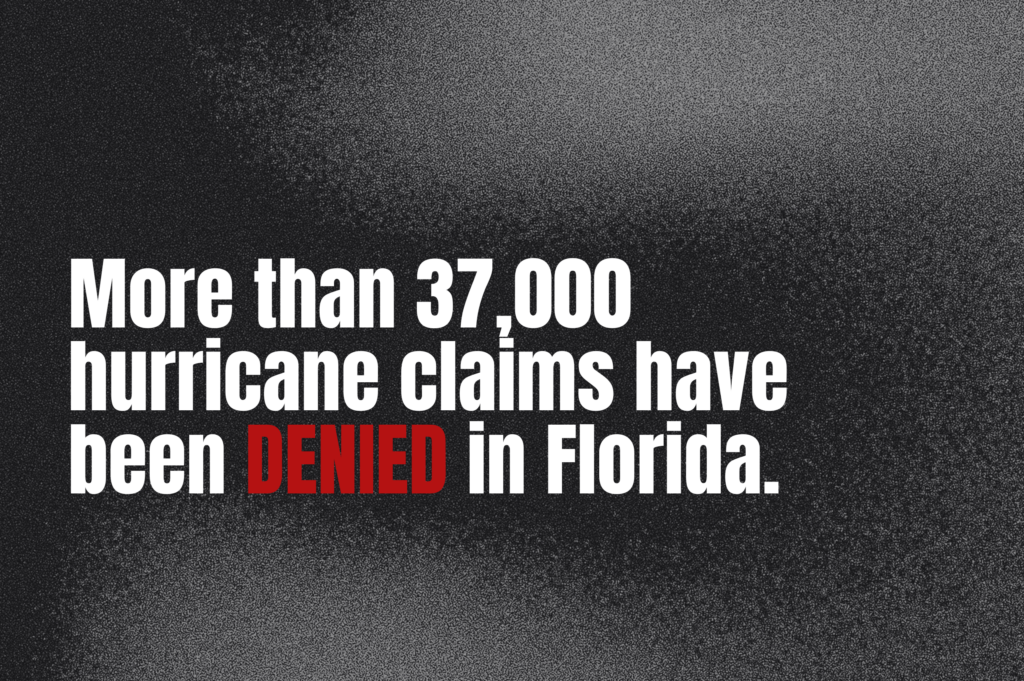What Your Insurance Carrier Should Have Done by Now
It’s been nearly three months since Hurricane Helene and Milton left paths of destruction across the Southeast. For those impacted, the recovery process has been long and challenging. If you’ve filed an insurance claim, you might wonder what’s taking so long—or if your insurance carrier has met their obligations.
Insurance Carrier Responsibilities Post-Hurricane
Insurance carriers have legal and ethical obligations to handle claims promptly and fairly. Here’s what they should have completed within 90 days:
-
-
- Initial Acknowledgement: Insurers shall, “within 14 calendar days, review and acknowledge receipt of such communication unless payment is made within that period of time or unless the failure to acknowledge is caused by factors beyond the control of the insurer, which reasonably prevent such acknowledgment,” Florida Senate 627.70131.1a.
- Inspection and Investigation: The Florida Senate 627.70131.3a states that “unless otherwise provided by the policy of insurance or by law, within 14 days after an insurer receives proof of loss statements, the insurer shall begin such investigation as is reasonably necessary unless the failure to begin such investigation is caused by factors beyond the control of the insurer which reasonably prevent the commencement of such investigation.”
- Claims Decision: Under Florida law, “Within 90 days after an insurer receives notice of an initial, reopened, or supplemental property insurance claim from a policyholder, the insurer shall pay or deny such claim or a portion of the claim unless the failure to pay is caused by factors beyond the control of the insurer which reasonably prevent such payment,” Florida Senate 627.70131.7a. If payment is delayed beyond 90 days or 15 days after any uncontrollable delays are resolved, insurers are required to pay interest on the claim. This interest starts accruing from the date the insurer first receives notice of the claim and continues until payment is issued. These legal requirements cannot be waived or voided by policy terms, and noncompliance constitutes a violation of Florida’s insurance code, though it does not independently allow for a private lawsuit.
-
Unfortunately, thousands of policyholders are still waiting.

Reported by Newsweek.
Hurricane Helene
The numbers don’t lie—Hurricane Helene left a staggering financial footprint. FEMA has estimated National Flood Insurance losses to fall between $3.5 and $7 billion as of November 12, 2024. In Florida alone, the Insurance Journal reports that over 65,700 claims have already been filed, with 33,130 for residential properties.
These figures don’t just represent damaged buildings—they’re a testament to the emotional and financial toll on homeowners grappling with recovery. Thousands of families await relief as insurers sift through a mountain of claims. For policyholders, these delays are more than just frustrating—they can be life-altering.
Hurricane Milton
The devastation of Hurricane Milton extends far beyond the physical wreckage, reflected in the staggering number of insurance claims filed. JT Law Firm reports more than 230,000 claims—spanning commercial and residential properties—have been submitted. The real shock lies in the unresolved cases. 112,826 residential claims are still open and unpaid, while an additional 53,372 have been closed without a single dollar disbursed.
These aren’t just numbers—they’re stories of homeowners left in limbo, forced to navigate the financial and emotional turmoil of rebuilding with little to no support. The hurricane didn’t just tear through neighborhoods—it exposed cracks in the system meant to protect policyholders in their time of need.
Steps to Take If You’re Still Waiting
If your hurricane claim hasn’t been resolved, here are actionable steps you can take:
- Request a Timeline: Ask your carrier for a formal schedule outlining the next steps in your claim process.
- Documentation Communication: Keep records of every interaction, including emails, phone calls, and written notices.
- Seek External Support: Consider hiring a public adjuster to accurately value your claim, advocate for your best interests, and manage the insurance claims process.
How Premier Claims Can Help Your Hurricane Claim
At Premier Claims, we focus on turning delayed or denied claims into successful settlements. Our team extensively handles hurricane-related claims, fighting for policyholders to receive the payouts they’re entitled to.
How Long Does a Hurricane Claim Take to Settle?
If you’re curious about the insurance claim process after a major storm, look at our in-depth case study. Follow the ongoing journey of a complex claim in Homerville, Georgia, where Hurricane Helene caused significant damage to a chicken farm. This timeline highlights the steps taken so far—from initial inspections to the progress made in securing payments—offering a behind-the-scenes look at how Premier Claims tirelessly advocates for policyholders through every stage of the insurance process.
Don’t Walk—Take Action Today
If you’re frustrated by delays or low offers, now is the time to act. Contact Premier Claims for a free policy review and start your journey toward a fair settlement. For more details on claims data and recovery timelines, visit the Florida Department of Financial Services and the National Flood Insurance Program.
Your recovery is our priority. Let’s rebuild together.
"*" indicates required fields
